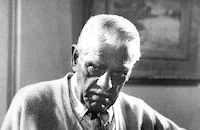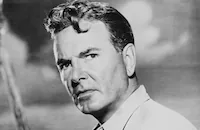British Intelligence

Brief Synopsis
Cast & Crew
Terry Morse
Boris Karloff
Margaret Lindsay
Bruce Lester
Leonard Mudie
Holmes Herbert
Film Details
Technical Specs

Synopsis
During World War I. British Intelligence is baffled by the clever German spy Franz Shindler, and dispatches pilot Frank Bennett to pick up Williams, a crack British spy operating behind German lines. Before he can complete his mission, Frank's plane is shot down and he is hospitalized in France, where he meets and falls in love with his nurse, Helene von Lerbeer. Helene, a German spy, abruptly leaves Frank when German Intelligence places her in the London home of Frank's father Arthur Bennett, a new cabinet minister. Posing as Frances Hautry, a fugitive from the German detention camps, Helene is offered sanctuary at the Bennett house and there she meets Valdar, a German agent posing as a servant. Valdar tells Helene that he is her liaison to Shindler, who is now operating in London. Helene falls under suspicion when Crichton, a British agent, discovers Bennett's secretary sending messages to her in German code. Allegiances become more complicated when Valdar, sans his French accent, visits Colonel John Yeats, the head of British Intelligence, and reveals himself as a double agent working undercover for Britain. Yeats confides to Valdar that a British cabinet meeting is to convene secretly the next night in the Bennett library. Meanwhile, to trap Frances, Yeats has a British agent impersonate Kurtz, an escaped German spy, but Frances outwits Yeats and turns the fake Kurtz over to the police. Frances warns Valdar that she has been discovered, but he insists that she remain at the Bennett house until the cabinet meeting has convened. Shortly after, Frank arrives home from France and recognizes Helene, who confesses that she is a British agent. Overhearing her confession, Valdar imprisons her in the basement, where he reveals that he is Shindler and accuses her of being a British spy. After Helene convinces Valdar that she is loyal to Germany, he shows her the bomb that he has set to destroy the cabinet ministers. At that moment, Yeats and his men pound at the basement door, and Helene lets them in to defuse the bomb. Shindler escapes through a coal shoot, but meets his death in a German air raid.

Director
Terry Morse
Cast

Boris Karloff

Margaret Lindsay
Bruce Lester

Leonard Mudie

Holmes Herbert
Austin Fairman Bennett

Maris Wrixon
Winifred Harris
Lester Matthews
John Graham Spacy
Clarence Derwent
Louise Brien
Frederick Vogeding
Carlos De Valdez
Frederick Giermann
Willy Kaufman
Frank Mayo
Stuart Holmes
Sidney Bracey

Jack Mower
Leonard Willey
Morton Lowry
Evan Thomas

Lawrence Grant
Denis D'auburn
Craufurd Kent
Carl Harbaugh
Ferdinand Schumann-heink
Joseph De Stefani
Jack Richardson
Bob Stevenson
Glen Cavender
Henry Von Zynda
Hans Schumm
Arno Frey
Gordon Hart

John Sutton
Leyland Hodgson
David Thursby

Paul Panzer
Crew
Elmer Decker
Bryan Foy
Mark Hellinger
Sid Hickox
Stanley Jones
Lee Katz
John Langan
Thomas Pratt
Hugh Reticker
H. Roemheld
Howard Shoup
Jack L. Warner

Film Details
Technical Specs

Articles
British Intelligence -
Kelly's play was shot in Hollywood three times in 15 years, in 1926, 1930 and 1940, and remained remarkably unchanged as a WWI thriller even as Europe and America grew farther from one war and closer to another. The first was a vehicle for forgotten Dutch vamp Jetta Goudal and, in the key role as Valdar the spy-butler, Clive Brook; the second, an early talkie, had Constance Bennett and Erich von Stroheim, and was clearly the most high-profile and lavish of the three. The third, Terry Morse's British Intelligence, is clearly one of those cheap and fast quickies the studios - in this instance, Warner - ground out at the onset of war, as the sheerest propaganda. In all likelihood, the immediate demand for product that corresponded with the public's reality probably prompted Warner to ransack its archive for quickly remakable projects, and that's where Three Faces East waited. Hollywood didn't want to wait for WWII stories to naturally emerge in 1939 and 1940, so they began converting WWI material and simply making the Germans in 1917 rabid Nazis in behavior, if not in uniform. "Someday!" the raving Commandant hollers, "Someday Germany will own the world!"
That didn't seem so campy in 1940. Still, there's a good deal to be said for the comfy, calm, resplendently fake confines, for dramatic purposes in any genre, of the aristocratically appointed English mansion, and that's where most of Kelly's saga takes place. Specifically, the home of the Lord of the Admiralty, where Valdar (in this incarnation, it's Boris Karloff, sporting an elaborate sword-slash facial scar) butlers and where the heroine spy, played by Margaret Lindsay, ventures, in pursuit of secret battle plans and/or the mysterious master spy who's after the battle plans. Frankly, none of the versions of Kelly's play are easy to vet, in terms of exactly which double agent is actually for the Kaiser and which is actually for the Brits, which was doubtless intentional. But in every case, the casting of a savvy but sweet female lead against an unsavory and somewhat creature-ish character actor tells us how things will pan out when it's all said and done. In the meantime, Karloff tries on three different accents as he discloses his "real" allegiances, and we're not sure if Lindsay is in fact officially British, Belgian or German, while of course being perfectly sure all the while.
You pay for your pleasure with the propagandistic cant -- a climactic speech extolling the call to war is spoken directly at 1940 filmgoers -- but the fringe benefits are ample, including tons of archival stock footage, some real, some culled from movies like 1930's All Quiet on the Western Front, leading up to the German strategic bombing of London featuring dreamy steampunk visions, from where we do not know, of zeppelins floating through the clouds. Karloff feels out of place in general, but of course his actorly commitment refuses to weaken; he had the courtly gift of seeming to be invested in his movie moments regardless of the film he's in. (For Karloff, that meant lending dignity to hundreds of roles in undeserving films and TV shows.) But Lindsay, in the lead, is the surprise here, amidst a Mount Rushmore of craggy British supporting-role faces. A lovely brunette almost-star who toiled in Hollywood not quite becoming famous for decades, Iowa-born Lindsay has a disarmingly fetching middle-period Jane Fonda smile and deep husk to her voice, and her mature sexiness and unforced poise are hypnotic. What happened to her? Warner Bros. kept her career at a low boil for most of the '30s, but once she went freelance, even grabbing the female lead in the 1940 version of The House of Seven Gables, she became a B-movie staple, mostly supporting Ralph Bellamy in the Ellery Queen series. Her arc petered out in the '60s with a predictable litany of TV parts, before she retired at 65. Once you've noticed her in Morse's film, you'll be on the lookout for her, popping up in dozens of Golden Age projects, many of which you've probably already seen (G-Men [1935], Dangerous [1935], Jezebel [1938]), but now need to see again. British Intelligence is very much an artifact of its day: hurried, utilitarian, living on borrowed sets and manufactured with ulterior motives in mind, as was so much of America in the early '40s. It's nostalgia that's nostalgic for the '10s, while never shaking the immediate sense of preparing for war in 1940.
By Michael Atkinson

British Intelligence -
Quotes
Trivia
Notes
The working title of this film was Secret Enemy. The Anthony Paul Kelly play was previously filmed as Three Faces East in 1925 by Cinema Corp. of America, directed by Rupert Julian and starring Jetta Goudal and Robert Ames, and in 1930 by Warner Bros., directed by Roy Del Ruth and starring Constance Bennett and Erich von Stroheim (see AFI Catalog of Feature Films, 1921-30; F2.5655 and F2.5656).















